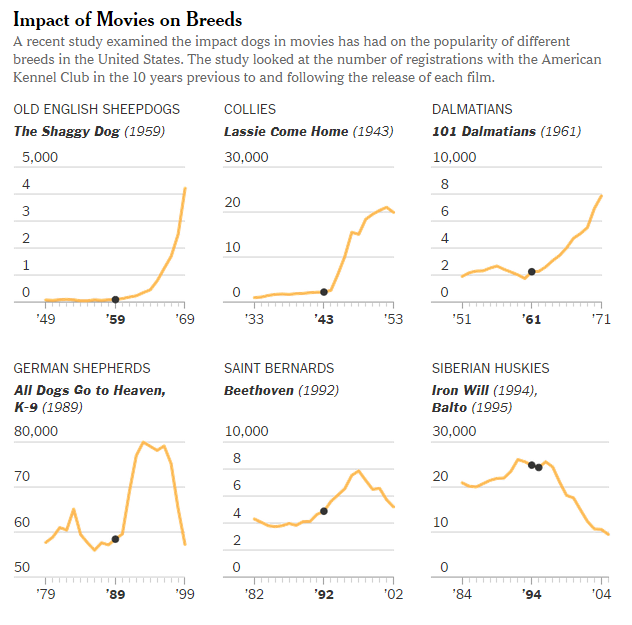Most Americans, when asked if they are affected by advertising, will say “not really.” They think other people are influenced by cultural messages, but that they are somehow immune.
Whether people are shaped by the media they consume seems to be a perpetual question. The fact that billions of dollars are spent every year attempting to influence us is probably a sign that advertisers know it works. Scientists get in on the action, asking pressing questions like: Do violent video games increase violence in real life? Do sexy, thin models hurt girls’ self-esteem? We do the studies and the answers are often inconclusive, probably because of how complicated the relationships are.
Psychologist Stefano Ghirlanda and his colleagues asked a slightly simpler question: Do celebrity dogs influence the popularity of dog breeds? They looked at 100 movies with prominent dog characters from 1939 to 2003 and compared the release date to breed registrations. The answer seems to be: with the exception of box office flops, yes.

Given that many dog movies are made for kids, I’d be interested in the mediating role of parenthood. Companies that make children’s products like sugary cereal know that they can get the parent to buy their product if the kid is annoying enough about it. So they market to children directly. I’d love to see if people with and without small children were equally affected by the breed of dog in this year’s movies.
The researcher’s method of popularity, moreover, was registration with the American Kennel Club. Pure bred dogs are expensive. I wonder if the power of these trends varies by social class. If a family can’t afford a “Beethoven,” they may be more likely to just adopt a mutt from a neighbor’s litter.
In any case, though, this seems like incontrovertible evidence that we’re influenced by mass media. But you already knew everyone else was, didn’t you?
This post originally appeared on Sociological Images, a Pacific Standard partner site, as “Dog Movies Powerfully Influence Dog Ownership.”




